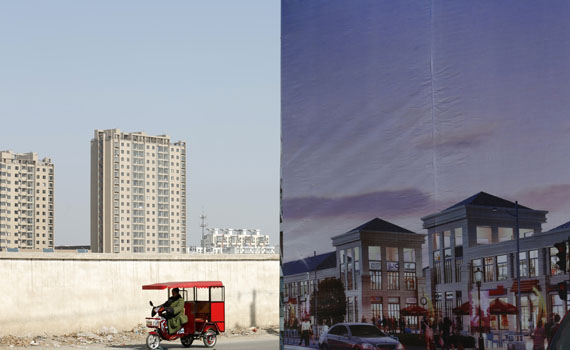



As Chinese authorities try-and repeatedly fail-to cool off the nation's red-hot real estate market, the real-world impact of high housing prices is being keenly felt in the nation's capital, Beijing. In a recent viral post on Douban, a Chinese social media platform featuring discussion of books, music, and movies popular among the country's young intelligentsia, user @斯弥的日记 explained exactly how. Tea Leaf Nation translates the post in full, with the user's permission. Please enjoy.
- Chinese Web Users Marvel at Detroit
- Chinese Peasants to the Local EPA: Drink This Nasty Water!
- A Grassroots View of the One Child Policy
If I Talk About Housing Any More, I Will Cry
It was around the weekend of March 2. Wood and I looked at the real estate agency company's bulletin board downstairs, and realized that the price of our apartment had already risen to 40,000-50,000 RMB [between about US$6,400 and US$8,000] per square meter.
I said to Wood: whatever you do, don't tell the landlord.
Who'd have guessed: the following Monday, we received an email from the landlord. She wanted to sell the house and would come back from abroad to do the paperwork.
Our apartment was relatively cheap when we rented it - 3,300 RMB [about US$530] per month, not including water, electricity, or Internet. It's about 63 square meters [one square meter is about 10.8 square feet]. The only complaint we had about this place is the lack of parking space. We spend a lot of time wandering around the residential unit, finally squeezing the car into any nook or cranny. The light scratches on the car surface as a consequence no longer bother us.
After that, Wood and I have been looking for a new place whenever we have time. All the other similar options are over 5,000 RMB/month, though.
And then there's this "five point plan" thing [referring to a Chinese State Council plan released in February aimed at reducing real estate speculation]. Day and night, the real estate agency's LED screen runs red slogans like "interpreting the five point plan" and "efficient ownership transfer." We've seen a lot more people going in and out of the agency since then.
Housing prices haven't come down, and the rising tide is lifting rental prices alongside it. Apartments in the same residential unit with way worse interior conditions than ours have their price set at 4,600 RMB per month, minimum. It makes sense, though: without notice, the selling price of our residential unit has been raised to 53,000 RMB per square meter. A nearby unit within a 10 minute walk costs almost 100,000 RMB [about US$16,000] per square meter.
Looking back at the house people were talking about in the Wanliu neighborhood -- 8 million RMB for over 140 square meters [or about US$1.3 million for 1,500 square feet] -- I no longer find it expensive.
It's said that the magic of Beijing's real estate market is that regardless of when you enter, you always think you've seen its peak. But within two or three years, you've turned a profit.
A schoolmate of mine and her husband got their master's from Renmin University and worked in finance. They bought an apartment near Lishui Bridge in 2010, not so long after they graduated. It was 14,000 RMB per square meter and the apartment was 90 square meters -- they spent all that their parents had. Now when talking about house hunting, she said that either she or her husband should have started working right after college, while the other did their master's, and they could have bought an apartment three years earlier that way.
Three years before, Wood's savings was probably enough for a down payment for some small apartment near the Huilongguan neighborhood. Now we're not even thinking about that option -- Huilongguan costs almost 30,000 RMB per square meter.
Last weekend we went out with two students. Wood and I were talking about house-hunting the entire trip. I think the two of them thought we were vulgar and were bored to death.
But those who haven't been facing this problem can never feel empathy for us. I would never have imagined even two or three years ago that a house could matter so much in our lives.
There are some who might say, don't buy a house, just rent one. Can't you just rent for the rest of your life? No. Let's just talk about one thing -- if I ever have children, don't I need a hukou [a residence permit entitling someone to local benefits including education] for him or her? Without a house, where can I register the child?
Someone else may say, just register the child in your hometown. Well, I personally can, but most people have transferred their household registration to where they live, when they came out for college. There's no way back.
Another problem of renting is that you can be thrown out at any time. Like what we are facing right now. We can't blame the landlord, though - she would be able to purchase a 600 square meter country house in the US if she chooses to sell this 63 square meter apartment in Beijing.
Since we can't find an apartment, I was telling Wood that I should just move back to my hometown in Jiangsu. If he could live and eat in his company office and not go out on weekends for six months, we would be able to save 60,000 RMB.
A friend joked: "So the price of a sex life is 60,000?" More or less, at least for six months.
I've heard so many love stories that end either happily or tragically just for a house -- even though that should be the worst excuse. Well, I need to just stop, if I say any more I am going to cry. We're definitely leaving the capital!

